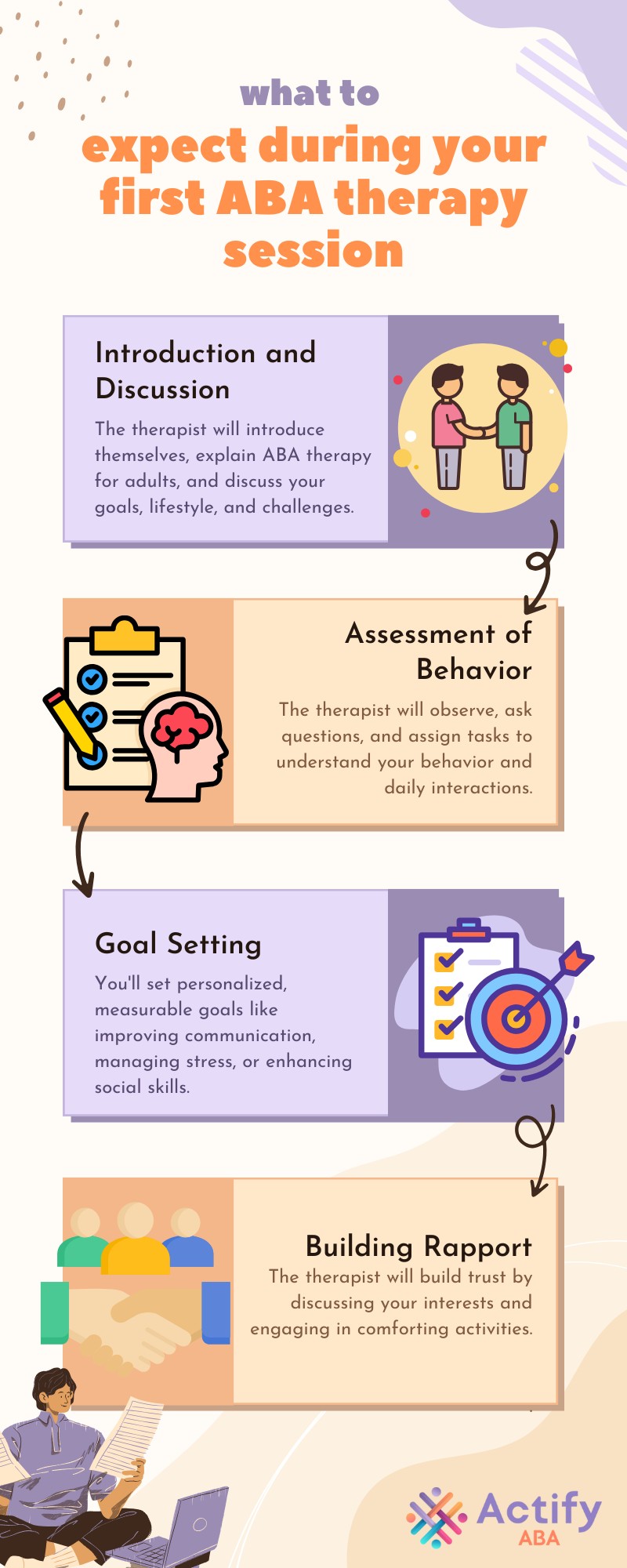
Key Points:
- Adults with autism often face significant challenges when it comes to coping with change, which can affect their emotional and social well-being.
- Understanding triggers of stress and employing strategies like routine adaptation and emotional regulation can help manage change.
- ABA therapy plays a crucial role in helping adults with autism develop coping mechanisms to handle transitions more effectively.
Change is a natural part of life, but for adults with autism, it can be a particularly stressful and challenging experience. According to the Centers for Disease Control and Prevention, about 2.21% of adults have autism in the United States.
Whether it’s a shift in work schedule, a change in personal relationships, or a move to a new environment, the unpredictability that comes with transitions can be overwhelming. For individuals with autism, coping with change requires developing specific strategies that address their unique needs.
These strategies often focus on reducing anxiety, enhancing adaptability, and building resilience in the face of new situations. In this article, we will explore some effective strategies for autism coping with change in adults and how ABA therapy can help in this process.
What Are the Main Challenges Adults with Autism Face When Coping with Change?
When it comes to autism coping with change, adults often struggle with difficulties in adapting to new circumstances. The need for predictability and routine is a defining characteristic for many individuals on the spectrum, and changes in daily life can lead to stress, confusion, and even behavioral difficulties. This struggle with change can have a significant impact on personal relationships, professional life, and overall mental health.
Challenges may include:
- Difficulty with emotional regulation: Adults with autism may find it harder to manage the feelings of anxiety, fear, or frustration that come with transitions.
- Resistance to new routines or environments: Predictability is key, and any alteration in their environment or schedule can lead to feelings of discomfort.
- Social challenges: Interacting in new or unfamiliar situations can be difficult, particularly if social norms or expectations change.
These challenges can disrupt daily life and cause increased stress, but understanding these difficulties is the first step in finding effective coping strategies.

How Can Adults with Autism Adapt to Change in Their Routine?
Adaptability is a critical skill when it comes to autism coping with change, but it’s not always something that comes naturally. Adults with autism often rely on routines for comfort, and when those routines are disrupted, they can experience stress and confusion. Developing strategies to make these changes easier is key to managing them successfully.
The process starts by creating a predictable framework around changes. When an event or transition is approaching, preparing in advance can make the shift feel less overwhelming. This preparation might involve introducing new activities slowly, giving clear instructions about what will change, and providing visual or verbal cues that help make the transition smoother.
Strategies to help adults adapt to routine changes include:
- Preparation and previewing: Whenever possible, inform them about the upcoming change well in advance. Visual schedules or written reminders can help provide clarity.
- Gradual transitions: Instead of sudden shifts, introduce changes in small, manageable steps. For example, adjusting a daily routine by 10 minutes at a time allows for better adjustment.
- Consistency in key areas: While other areas may change, try to maintain consistency in certain routines (e.g., meals, bedtime) to provide a sense of stability.
ABA therapy can assist in developing these strategies by reinforcing positive behaviors when change occurs and helping adults with autism learn how to handle new situations more effectively.
Managing Anxiety and Stress During Transitions
For many adults with autism, the emotional toll of change can be particularly intense. Anxiety can escalate when faced with a new situation, and it often manifests as physical symptoms (e.g., restlessness, irritability) or behavioral reactions (e.g., meltdowns, withdrawal). One of the keys to managing this stress is identifying the early signs of anxiety and implementing strategies to calm down before emotions reach a boiling point.
Effective methods for managing anxiety during transitions include:
- Breathing exercises: Simple techniques, like deep breathing or progressive muscle relaxation, can help manage anxiety.
- Self-soothing activities: Engage in calming activities that the individual enjoys, such as listening to soothing music, using a fidget tool, or practicing mindfulness.
- Cognitive behavioral strategies: Help the individual challenge negative thoughts about change and replace them with more positive, realistic ones.
Anxiety reduction is a crucial element of autism coping with change in adults, and developing tools for self-regulation can help adults with autism feel more confident in handling transitions.
How Can Social Support Help Adults with Autism Cope with Change?
Support from family, friends, and colleagues plays a vital role in helping adults with autism manage change. Having a strong social network provides reassurance, reduces feelings of isolation, and can make transitions feel less intimidating.
However, it’s essential to understand that the way support is provided matters. Many adults with autism may find certain social interactions overwhelming, and offering them support in a calm and structured manner can make a significant difference.
For example, it’s important to give clear and concise information about what will happen during a change and to offer reassurance that they are not alone in navigating the transition. Some individuals may also benefit from having a designated “support person” during times of significant change, such as a family member or a trusted colleague.
Social support strategies include:
- Clear communication: Use simple, direct language when explaining changes, and avoid overwhelming the individual with too much information at once.
- Reassurance and positive reinforcement: Encourage and praise the individual for successfully managing transitions and offer words of support during difficult times.
- Buddy systems: Assigning a person to provide guidance during changes, whether at work or in social situations, can ease the transition.
Support from a familiar and trusted person can greatly enhance the process of coping with change, making the adult with autism feel more comfortable navigating unfamiliar situations.
Creating a Sensory-Friendly Environment to Ease Transitions
Sensory sensitivities are a common feature of autism, and they can make changes in the environment particularly difficult. For example, changes in lighting, noise levels, or even the layout of a space can cause significant distress. By creating a sensory-friendly environment, it becomes easier for adults with autism to cope with changes in their surroundings.
Consider using noise-canceling headphones, soft lighting, or familiar objects in new spaces to reduce sensory overload. These simple supports can make a big difference—from childhood through the later stages of life. If a major change, like a move or new living arrangement, is ahead, try to carry over elements of the previous environment that felt calming and familiar.
Strategies for creating a sensory-friendly environment include:
- Use calming sensory tools: Provide access to sensory items like textured fabrics, weighted blankets, or headphones that help regulate sensory input.
- Control sensory stimuli: Limit overwhelming sensory input, such as loud noises or bright lights, to create a more comfortable space.
- Familiar items: Incorporating personal belongings, like favorite objects or scents, into new spaces can provide comfort and stability.
ABA therapy can also help adults with autism learn strategies for managing sensory sensitivities, making transitions smoother and more manageable.
How ABA Therapy Can Help Adults with Autism Cope with Change
ABA (Applied Behavior Analysis) therapy is a powerful tool for addressing autism and coping with change in adults. This therapy focuses on understanding behavior patterns, providing structured learning, and reinforcing positive coping strategies. By breaking down challenges into smaller, more manageable steps, ABA therapy can help adults with autism navigate transitions with greater ease.
ABA therapists can work with individuals to identify triggers for stress and anxiety, create personalized strategies for coping with change, and reinforce desired behaviors. Over time, these skills become ingrained, and individuals with autism become more adaptable and confident in the face of change.

ABA Therapy in Maryland – Helping Adults Navigate Change
If you or a loved one is struggling with autism and coping with change, Actify offers ABA therapy in Maryland that can help. Our expert therapists work closely with adults to develop personalized strategies for managing transitions, reducing anxiety, and building resilience.
With ABA therapy, we focus on empowering individuals with autism to feel more in control of their lives and capable of handling change. Contact us today to learn more about how ABA therapy can make a difference in managing transitions and improving quality of life.
